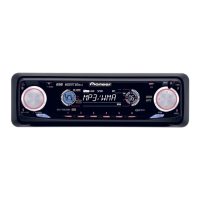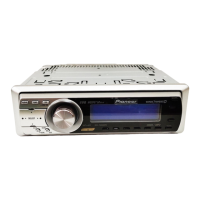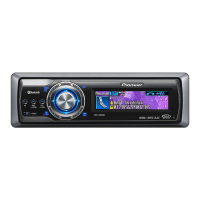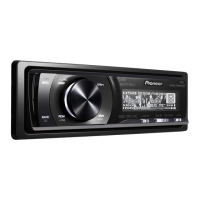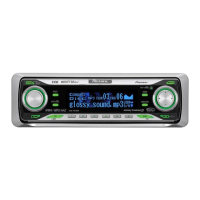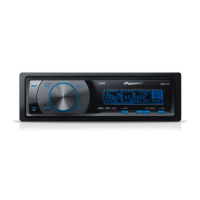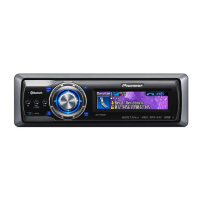Do you have a question about the Pioneer DEH-P5630MP and is the answer not in the manual?
Information on tuner frequencies, RDS function, and preset memory.
Guidance on using the manual for understanding functions and precautions.
Essential safety and operational precautions, including laser product warnings.
Instructions for troubleshooting and contacting authorized service stations.
Overview of playback capabilities for CDs, MP3, WMA, and WAV files.
Guidelines for handling the detachable front panel to prevent damage and theft.
Step-by-step instructions for detaching the front panel for security purposes.
Instructions for securely reattaching the front panel to the unit.
Identification and function of main controls and displays on the head unit.
Information regarding the availability of an optional steering remote control.
Description of ATT and VOLUME buttons for sound level adjustment.
Procedure for powering on the unit by selecting an audio source.
Procedure for powering off the unit by holding the SOURCE button.
How to choose and switch between available audio sources.
Basic steps for tuning into radio stations, selecting bands, and adjusting volume.
Explanation of indicators like Stereo, Preset Number, Frequency, and Band.
Steps for manual station tuning and automatic seek tuning.
Explanation of LOC, Preset Number, and Function display indicators.
How to store and recall radio station frequencies using preset buttons.
Using local seek tuning to find stations with sufficiently strong signals.
Adjusting local seek tuning sensitivity levels for optimal reception.
How to disable local seek tuning and revert to normal seek tuning.
Using BSM to automatically store the six strongest broadcast frequencies.
Overview of RDS features like program service name, news, and text indicators.
Explanation of Program Service Name, News, TEXT, and TP indicators.
How to cycle through RDS display options: program name, PTY, and frequency.
Automatic search for stronger signals on the same network when reception weakens.
Enables automatic station search during preset recall for same programming.
Restricts automatic retuning to regional programs when AF is active.
How to automatically receive traffic announcements from TP stations.
Alerts when a TP station signal is lost, prompting search for new TP station.
How to search for stations based on Program Type (PTY) information.
Automatically switches to news broadcasts and returns to the previous source.
Handling emergency announcements triggered by PTY alarm codes.
How to view currently received and recently stored radio text information.
Saving up to six radio text transmissions for later recall.
A list of Program Type (PTY) codes and their corresponding program types.
Basic steps for inserting a CD and starting playback.
Explanation of Play Time and Track Number indicators.
Instructions for opening panel, inserting CD, and closing panel.
How to fast forward, reverse, or skip tracks during CD playback.
Overview of repeat, random, and scan playback functions.
Setting repeat modes for current track, folder, or all tracks.
Enabling random playback of tracks on a CD.
Playing the first 10 seconds of each track on a CD.
Temporarily stopping CD playback and resuming from the pause point.
Adjusting sound quality using COMP (compression) and BMX functions.
Switching between fast forward/reverse and 10-track search methods.
Roughly searching tracks by jumping 10 tracks at a time within a disc.
Inputting and displaying custom titles for discs for easier identification.
Step-by-step guide to inputting disc titles (up to 8 characters) for up to 48 discs.
Viewing entered disc titles and scrolling them if necessary.
Utilizing information encoded on CD TEXT discs like track titles and artist names.
Viewing disc, track, and artist information from CD TEXT discs.
Scrolling text information that exceeds the display's character limit.
Basic steps for playing MP3, WMA, and WAV files from discs.
Explanation of indicators for Folder, Play Time, MP3, WMA, and Track Number.
Instructions for opening panel, inserting CD-ROM, and closing panel.
Adjusting volume, selecting folders, and navigating tracks.
Important notes on playback compatibility, file formats, and error messages.
Overview of repeat, random, and scan playback functions for media files.
Setting repeat modes for folders, current track, or all tracks.
Enabling random playback of tracks within selected ranges (FLD/DSC).
Playing the first 10 seconds of tracks in a folder or first track of each folder.
Temporarily stopping playback of media files and resuming.
Adjusting sound quality using COMP (compression) and BMX functions.
Choosing between fast forward/reverse and 10-track search methods.
Roughly searching tracks within a folder by jumping 10 tracks at a time.
Turning on/off the display of text information (tag) for MP3/WMA files.
Viewing file names, track titles, artist names, etc. on MP3/WMA/WAV discs.
Displaying specific information related to WAV files.
Scrolling long text information like file names and titles.
Basic steps for controlling a multi-CD player.
Explanation of Disc Number, Play Time, and Track Number indicators.
Selecting the multi-CD player as the audio source.
Adjusting the volume level for the multi-CD player.
Choosing a disc from the magazine using the number buttons (1-6, 7-12).
Information on the functions supported for 50-disc multi-CD players.
Overview of repeat and random playback functions for multi-CD players.
Setting repeat modes for the entire player, current track, or current disc.
Enabling random playback of tracks within selected ranges (MCD/DSC).
Playing the first 10 seconds of tracks on selected discs or the first track of each disc.
Temporarily stopping CD playback and resuming from the pause point.
Creating and playing custom playlists of favorite tracks using ITS.
Step-by-step guide to creating ITS playlists for up to 99 tracks per disc.
How to play tracks that have been added to an ITS playlist.
Deleting individual tracks from an ITS playlist while ITS play is active.
Removing all tracks of a specific CD from an ITS playlist when ITS play is off.
Inputting and displaying titles for discs for easier selection and search.
Guide to inputting disc titles (up to 8 characters) for the multi-CD player.
Viewing entered disc titles and selecting them for playback.
Using the disc title list to find and play specific discs.
Viewing disc, track, and artist information from CD TEXT discs.
Scrolling text information that exceeds the display's character limit.
Adjusting sound quality using COMP (compression) and DBE (bass emphasis) functions.
Overview of various audio settings and their corresponding indicators.
Explanation of SFEQ, Loudness, SW, EQ-EX, and CUSTOM indicators.
How to access audio adjustment functions using the AUDIO button.
Smoothing equalizer effects and adjusting bass/treble with EQ-EX.
Adjusting sound image for vocals and instruments with SFEQ settings.
Adjusting front/rear and left/right speaker balance for ideal acoustics.
Adjusting equalization to match car interior acoustics.
How to recall stored equalizer curves like SPR-BASS, NATURAL, CUSTOM.
Adjusting center frequency, Q factor, and level for equalizer bands.
Detailed adjustment of center frequency and Q factor for equalizer bands.
Modifying the level of bass and treble adjustments.
Choosing the specific frequency for bass level adjustment.
Choosing the specific frequency for treble level adjustment.
Enhancing low and high frequencies at low volumes for better sound clarity.
Turning the subwoofer output feature on or off.
Adjusting subwoofer cut-off frequency and output level.
Enabling non-fading output via RCA for subwoofer connection.
Adjusting the output level for the non-fading signal.
Applying a high pass filter to prevent low frequencies from front/rear speakers.
Adjusting volume levels of different sources to prevent drastic volume changes.
Comparing FM tuner volume to adjust source volume for consistent levels.
Instructions for performing initial setup of various unit settings.
Adjusting the FM tuning step between 50 kHz and 100 kHz.
Enabling automatic station search during preset recall for same programming.
Turning the warning tone for front panel detachment on or off.
Activating the auxiliary input setting for connected equipment.
Turning the display dimmer function on or off for night use.
Configuring rear output for full-range or subwoofer and subwoofer controller settings.
Configuring audio muting or attenuation during phone calls.
Connecting and using auxiliary equipment via the AUX source.
Choosing AUX as the audio input source.
Customizing the display title for the AUX source.
Selecting one of two stored level indicator modes or turning it off.
Troubleshooting common CD player error messages, their causes, and actions.
Instructions for proper CD handling, disc types, and general player maintenance.
Information on using CD-R/CD-RW discs and potential playback issues.
Overview of MP3, WMA, and WAV file formats and their compatibility.
Details on MP3 file compatibility, ID3 tags, and recommended bit rates.
Details on WMA file compatibility, supported frequencies, and bit rates.
Details on WAV file compatibility, formats, and quantization bits.
Explanation of folder structure and playback sequence for MP3/WMA/WAV files.
Notes on folder numbering, skipping empty folders, and folder tier recommendations.
Definitions of technical terms like Bit rate, ID3 tag, ISO9660, LPCM, m3u, MP3, ADPCM, Multi-session, Quantization bits.
Technical specifications for power, grounding, dimensions, and weight.
Specifications for audio output, equalizer, loudness, and tone controls.
Specifications related to CD playback, disc types, and signal formats.
Specifications for FM tuner frequency range, sensitivity, distortion, and selectivity.
Specifications for MW tuner frequency range, sensitivity, and signal-to-noise ratio.
Specifications for LW tuner frequency range, sensitivity, and signal-to-noise ratio.
| CD Playback | Yes |
|---|---|
| MP3 Playback | Yes |
| WMA Playback | Yes |
| USB Input | No |
| Remote Control | Yes |
| Bluetooth | No |
| Power Output | 50W x 4 |
| Tuner | AM/FM |
| DIN Size | 1 DIN |
| Preset Stations | 24 |
